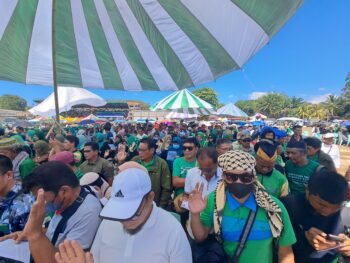DAVAO CITY (MindaNews / 29 August) — The interim Bangsamoro Parliament on Thursday approved the report of the Special Committee on Marawi (SCM), a 127-page document detailing issues faced by residents displaced and affected by the 2017 Marawi Siege and recommendations for the National Government and the Bangsamoro Government to act upon nearly three years after the “liberation” of Marawi and 16 months to the yearend2021 deadline of Task Force Bangon Marawi (TFBM).
President Rodrigo Duterte declared the country’s lone Islamic City “liberated from the terrorist influence that marks the beginning of rehabilitation for the people” on October 17, 2017. Secretary Eduardo del Rosario, TFBM chair, has repeatedly said rehabilitation efforts in Marawi will be completed by end of 2021 and he reiterated at the House Committee on Disaster Resilience hearing on August
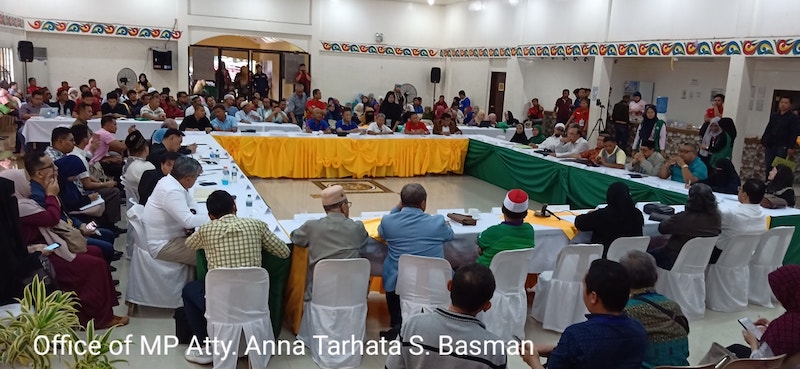 IDP representatives, Camp Leaders from the transitory shelters, and representatives of the missing and deceased people during the Marawi Siege attend the 2nd Public Hearing of the Bangsamoro Transition Authority – Special Committee on Marawi Rehabilitation at Mindanao State University, Marawi City in February 2020. Photo courtesy of the Office of MP Basman
IDP representatives, Camp Leaders from the transitory shelters, and representatives of the missing and deceased people during the Marawi Siege attend the 2nd Public Hearing of the Bangsamoro Transition Authority – Special Committee on Marawi Rehabilitation at Mindanao State University, Marawi City in February 2020. Photo courtesy of the Office of MP Basman
The SCM was created in September 2019 by the then six-month old Bangsamoro Parliament and constituted the following month to “look into the status of the Marawi recovery, reconstruction, and rehabilitation efforts,” cognizant of the fact that TFBM established by the national government in 2017 is in charge of the Marawi rehabilitation efforts.
The SCM had planned to submit its report by March or April but the lockdowns due to COVID-19 delayed its submission.
“From the beginning, it was clear to us that our work will complement the efforts of Task Force Bangon Marawi—and to do that, we understood that we needed accurate and complete information on the status of Marawi and its residents,” MP Anna Tarhata Basman, SCM Vice Chair, said as she presented the report to the Parliament.
The SCM conducted six “ exhaustively deliberative” committee meetings, three “informative public hearings” spread out over seven days, and numerous public consultations, went on field visits, gathered data and evidence, talked to experts and listened to the displaced and affected by the Marawi Siege who they thanked for “sharing your stories with us, for inviting us into your homes and lives, for telling us the problems you face and the aspirations you hold.”
“We have brought your voices to the Parliament. You have spoken. And we hope, along with all of you, that our leaders may hear,” Basman said.
“We hope to do right by the people of Marawi by providing them a stronger platform for their grievances and lending whatever machinery we have as a Parliament and as an autonomous government to address their urgent and perennial concerns,” Basman said, adding they also hope they “do justice to our people by putting the spotlight on the matters and issues they raised during our interactions.”
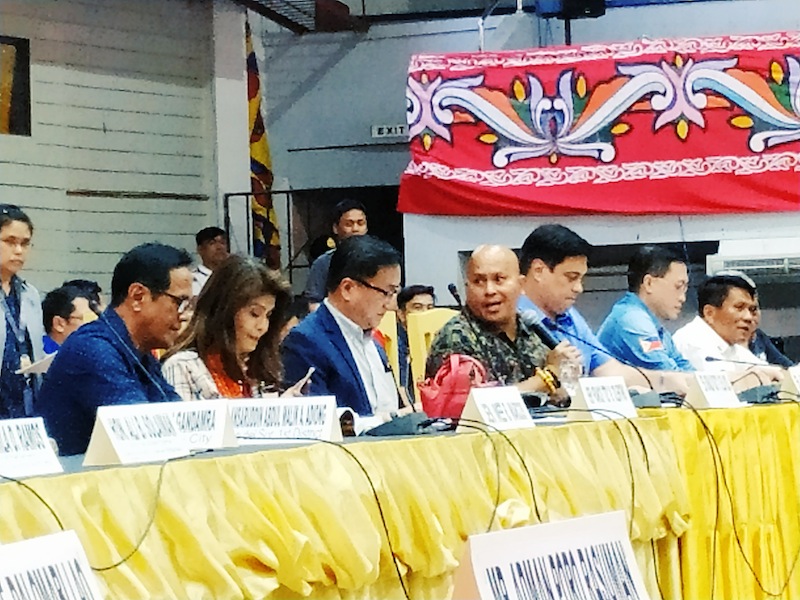 The Senate’s Special Committee on Marawi City Rehabilitation at the public hearing on 21 February 2020 at the Mindanao State University –Iligan Institute of Technology gym in Iligan City. Five senators were present: Ronald dela Rosa, committee chair; his two vice chairs, Francis Tolentino and Christopher Lawrence “Bong” Go and Imee Marcos, and Senate Majority Leader Juan Miguel Zubiri. MindaNews photo by CAROLYN O. ARGUILLAS
The Senate’s Special Committee on Marawi City Rehabilitation at the public hearing on 21 February 2020 at the Mindanao State University –Iligan Institute of Technology gym in Iligan City. Five senators were present: Ronald dela Rosa, committee chair; his two vice chairs, Francis Tolentino and Christopher Lawrence “Bong” Go and Imee Marcos, and Senate Majority Leader Juan Miguel Zubiri. MindaNews photo by CAROLYN O. ARGUILLAS
On February 21 this year, the Senate’s Special Committee on Marawi City held a public hearing on the Marawi rehab in Iligan City which took all of two hours and four minutes, 39 minutes of that spent on introductions, acknowledgement of participants and opening statements of five senators, 17 minutes on the briefing by TFBM and ended with committee chair Senator Ronald dela Rosa declaring that the “final solution,” the “ultimate solution” was to meet with President Duterte.
Duterte met with representatives of Marawi’s Internally Displaced Persons (IDPs), TFBM officials and the Senate Committee led by dela Rosa in a four-hour meeting on March 4 in Malacanang where the President vowed to visit the city once a month to check on the progress of the rehabilitation efforts. The following week, the lockdowns due to COVID-19 started.
Issues
The comprehensive report of the Bangsamoro’s SCM identified the many issues faced by residents of Marawi, particularly those in the Most Affected Area (MAA), the 250-hectare, 24-barangay ‘Ground Zero’ during the war between government forces and the Islamic State-inspired Maute Group and its allies. These are land, property rights, and shelters, including concerns regarding property ownership, the military reservation, clearing and demolition, taxes, housing, and temporary shelters; core necessities, including utilities, livelihood, education, and health; public works; data issues; questions with regard to inclusion, scope, and priority; transparency; transitional justice and security issues.
Deputy Chief Minister Ali Solaiman, who chairs the Committee, said many displaced residents are still prevented from returning home, three years after “liberation.”
Solaiman noted that some residents are still staying in temporary shelters, “still battling with the discomforts of unfinished shelters, inadequate water supply, sanitation and hygiene facilities.”
“I will not tell the people to blame the government but I cannot prevent their disappointment. They have every right to be disappointed. I, myself, am disappointed with the slow pace of the rehabilitation,” he said.
The SCM has 29 members, including all 21 MPs from the Lanao region. MPs Hamid Aminoddin Barra of Marawi and Abdullah Macapaar of Lanao del Norte, more popularly known as “Kumander Bravo” are vice chairs like Basman.
For the National Government
The SCM’s recommendations to the National Government include “improved transparency in the rehabilitation efforts and plans.”
Basman said fFrequent and regular updates on the process “will go a long way in this regard. Maximization of inexpensive communication channels –social media, radio, etc. –for this purpose is within our reach.”
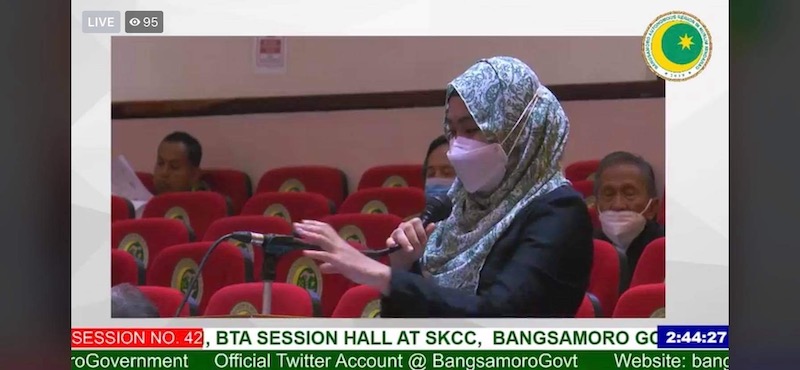 MP Anna Tarhata Basman presents the report of the Special Committee on Marawi to the interim Bangsamoro Parliament on Thursday, 27 August 2020. Photo courtesy of the SCM
MP Anna Tarhata Basman presents the report of the Special Committee on Marawi to the interim Bangsamoro Parliament on Thursday, 27 August 2020. Photo courtesy of the SCM
The SCM also reiterated how Marawi residents are “anxiously waiting on the immediate passage of the Compensation Law, which we have as a Parliament already urged the National Congress to pass in a resolution.”
“We cannot assign financial value to the losses our people suffered, but recognizing those losses and making sincere efforts to make reparations is an important step towards healing and normalization,” the SCM said.
Basilan Rep. and Deputy Speaker Mujiv Hataman during the August 18 hearing of the House Committee on Disaster Resilience had asked TFBM chair del Rosario to post regular “real-time” updates on the status of the Marawi rehabilitation program, including the state of its finances, on its websites and social media accounts for the benefit of the people of Marawi and the rest of the country.
“Yes we will comply,” del Rosario replied.
The SCM also said Marawi residents are counting on the security sector to address emerging security concerns in the aftermath of the siege as “the many different public perceptions on the plans and pace of rehabilitation is fueling the emergence of new security threats, and our people need our assurance that these are not being ignored.”
It also reiterated the call of residents to let them go home, to allow them to “freely visit their properties without need of prior authorization/permission –let them clean, clear, fence, and do what they must in their properties –especially those who have already shown incontrovertible proof of ownership.”
For the Bangsamoro Government
The SCM’s recommendations for the Bangsamoro Government include immediate organizational interventions such as establishing a dedicated office or board for a Bangsamoro Transition Authority-led Marawi Rehabilitation and Recovery and fixing data gaps and providing immediate and direct assistance.
The SCM also urged the Bangsamoro Government to work on hastening water distribution and construction of sanitation and hygiene facilities, hastening IDP access to electricity, prioritizing business and livelihood, synchronizing service delivery to avoid duplication and resentment, continuing providing health and education services, and assisting homeowners in identifying property boundaries.
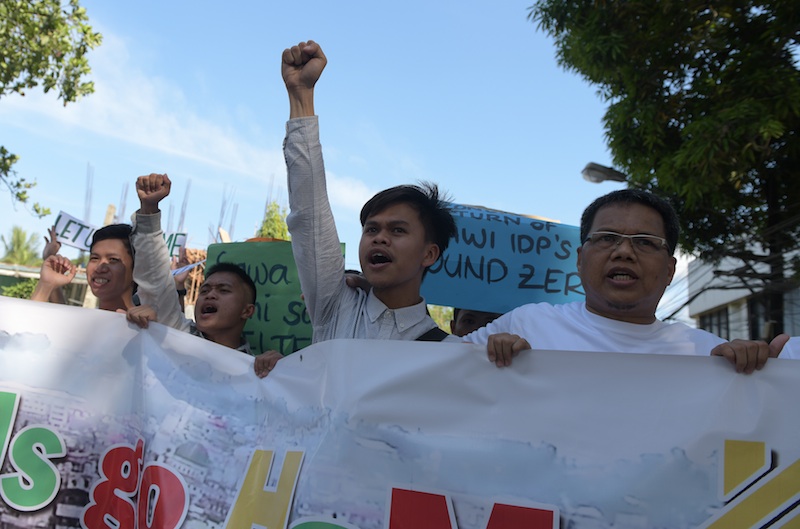 Displaced Marawi residents march in Iligan City from the Children’s Park to the Mindanao State University-Iligan Institute of Technology gym on February 21, 2020, venue of the public hearing conducted by the Senate’s Special Committee on Marawi City Rehabilitation. MindaNews photo by FROILAN GALLARDO
Displaced Marawi residents march in Iligan City from the Children’s Park to the Mindanao State University-Iligan Institute of Technology gym on February 21, 2020, venue of the public hearing conducted by the Senate’s Special Committee on Marawi City Rehabilitation. MindaNews photo by FROILAN GALLARDO
Its medium- to long-term recommendations include providing support for permanent housing development.
Basmsan said the Bangsamoro autonomous government is “well-poised to provide direct, immediate, and tangible assistance to the people displaced and affected by the Marawi Siege. At the same time, it has unique, well-grounded, and evidence-based insights which can supplement the efforts of our National Government in achieving inclusive, genuine, and comprehensive rehabilitation and recovery.”
She said the Committee is offering these insights “through this report in the spirit of sincere and earnest partnership and cooperation, and we hope they are taken well.” (Carolyn O. Arguillas / MindaNews)
READ
BANGSAMORO SPEAKS: By law, our jurisdiction over Marawi Rehab is limited but we cannot simply do nothing for those displaced and affected
Report of the Special Committee on Marawi
